A Comparative Study of Civil, Political, and Socio-Economic Rights
VerifiedAdded on 2023/06/05
|14
|4031
|192
Essay
AI Summary
This essay explores the comparative importance of civil and political rights versus socio-economic rights, beginning with an introduction to the historical context of rights and duties in various cultures. It defines civil and political rights as protections against governmental and societal transgressions, emphasizing freedoms such as speech, self-defense, protection from discrimination, political affiliation, and religion. The essay then discusses socio-economic rights, including universal public services like healthcare and education, decent living conditions supported by welfare and housing rights, workers' rights protecting against exploitation, and rights specific to social groups. The analysis considers Roosevelt's vision of economic and social welfare, highlighting the essential conditions for a dignified life. The essay concludes by suggesting that all rights are important and must be protected by the government.
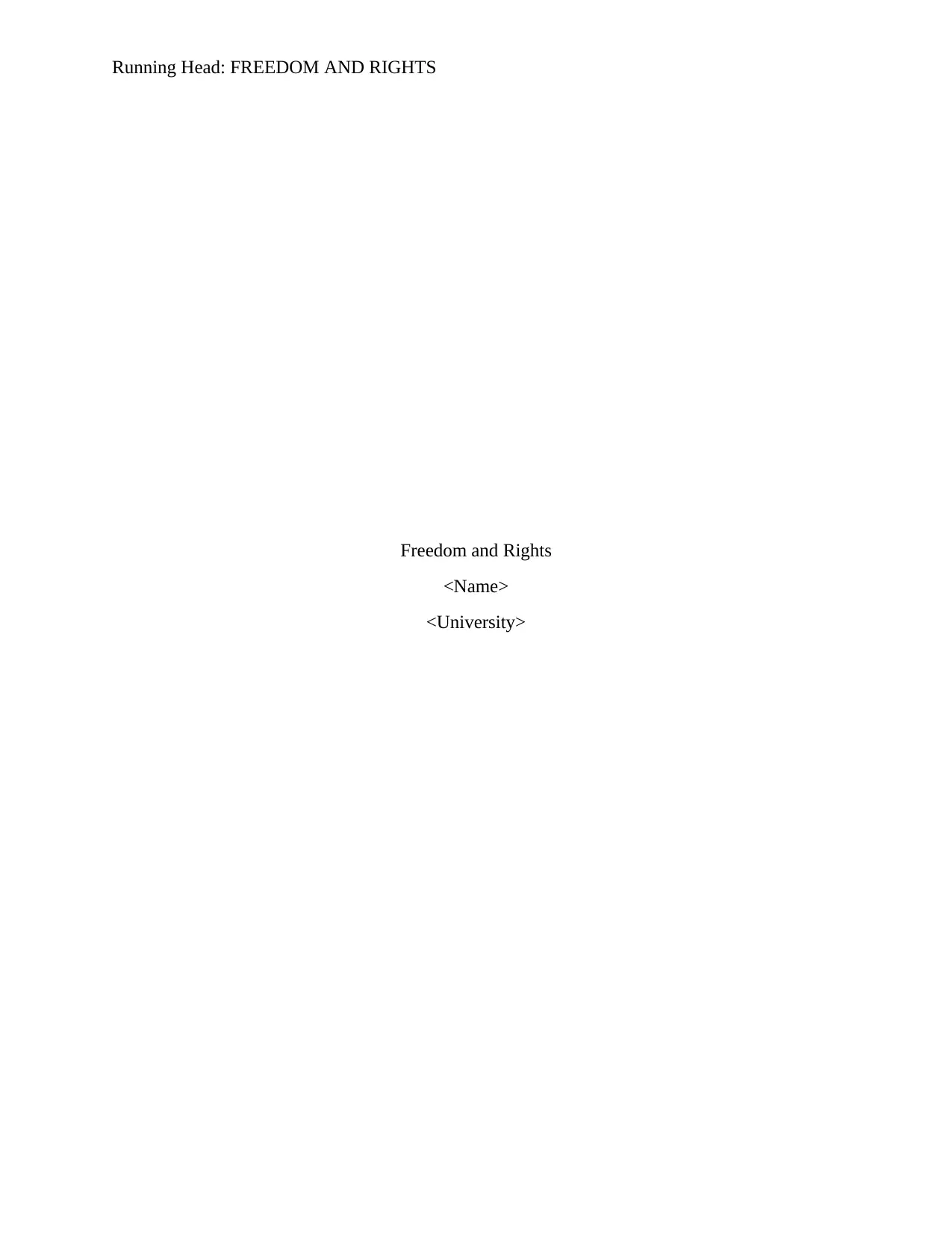
Running Head: FREEDOM AND RIGHTS
Freedom and Rights
<Name>
<University>
Freedom and Rights
<Name>
<University>
Paraphrase This Document
Need a fresh take? Get an instant paraphrase of this document with our AI Paraphraser
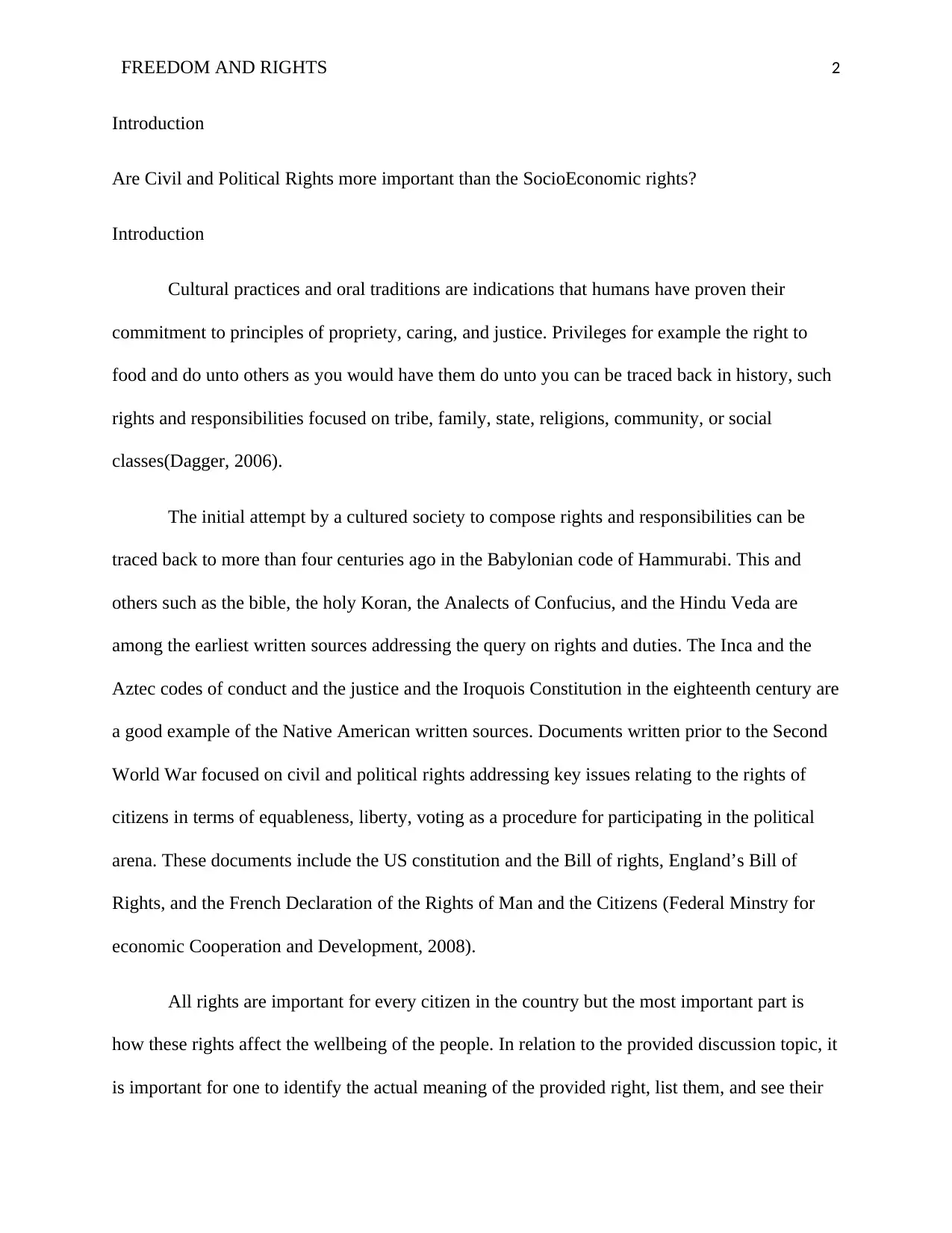
FREEDOM AND RIGHTS 2
Introduction
Are Civil and Political Rights more important than the SocioEconomic rights?
Introduction
Cultural practices and oral traditions are indications that humans have proven their
commitment to principles of propriety, caring, and justice. Privileges for example the right to
food and do unto others as you would have them do unto you can be traced back in history, such
rights and responsibilities focused on tribe, family, state, religions, community, or social
classes(Dagger, 2006).
The initial attempt by a cultured society to compose rights and responsibilities can be
traced back to more than four centuries ago in the Babylonian code of Hammurabi. This and
others such as the bible, the holy Koran, the Analects of Confucius, and the Hindu Veda are
among the earliest written sources addressing the query on rights and duties. The Inca and the
Aztec codes of conduct and the justice and the Iroquois Constitution in the eighteenth century are
a good example of the Native American written sources. Documents written prior to the Second
World War focused on civil and political rights addressing key issues relating to the rights of
citizens in terms of equableness, liberty, voting as a procedure for participating in the political
arena. These documents include the US constitution and the Bill of rights, England’s Bill of
Rights, and the French Declaration of the Rights of Man and the Citizens (Federal Minstry for
economic Cooperation and Development, 2008).
All rights are important for every citizen in the country but the most important part is
how these rights affect the wellbeing of the people. In relation to the provided discussion topic, it
is important for one to identify the actual meaning of the provided right, list them, and see their
Introduction
Are Civil and Political Rights more important than the SocioEconomic rights?
Introduction
Cultural practices and oral traditions are indications that humans have proven their
commitment to principles of propriety, caring, and justice. Privileges for example the right to
food and do unto others as you would have them do unto you can be traced back in history, such
rights and responsibilities focused on tribe, family, state, religions, community, or social
classes(Dagger, 2006).
The initial attempt by a cultured society to compose rights and responsibilities can be
traced back to more than four centuries ago in the Babylonian code of Hammurabi. This and
others such as the bible, the holy Koran, the Analects of Confucius, and the Hindu Veda are
among the earliest written sources addressing the query on rights and duties. The Inca and the
Aztec codes of conduct and the justice and the Iroquois Constitution in the eighteenth century are
a good example of the Native American written sources. Documents written prior to the Second
World War focused on civil and political rights addressing key issues relating to the rights of
citizens in terms of equableness, liberty, voting as a procedure for participating in the political
arena. These documents include the US constitution and the Bill of rights, England’s Bill of
Rights, and the French Declaration of the Rights of Man and the Citizens (Federal Minstry for
economic Cooperation and Development, 2008).
All rights are important for every citizen in the country but the most important part is
how these rights affect the wellbeing of the people. In relation to the provided discussion topic, it
is important for one to identify the actual meaning of the provided right, list them, and see their
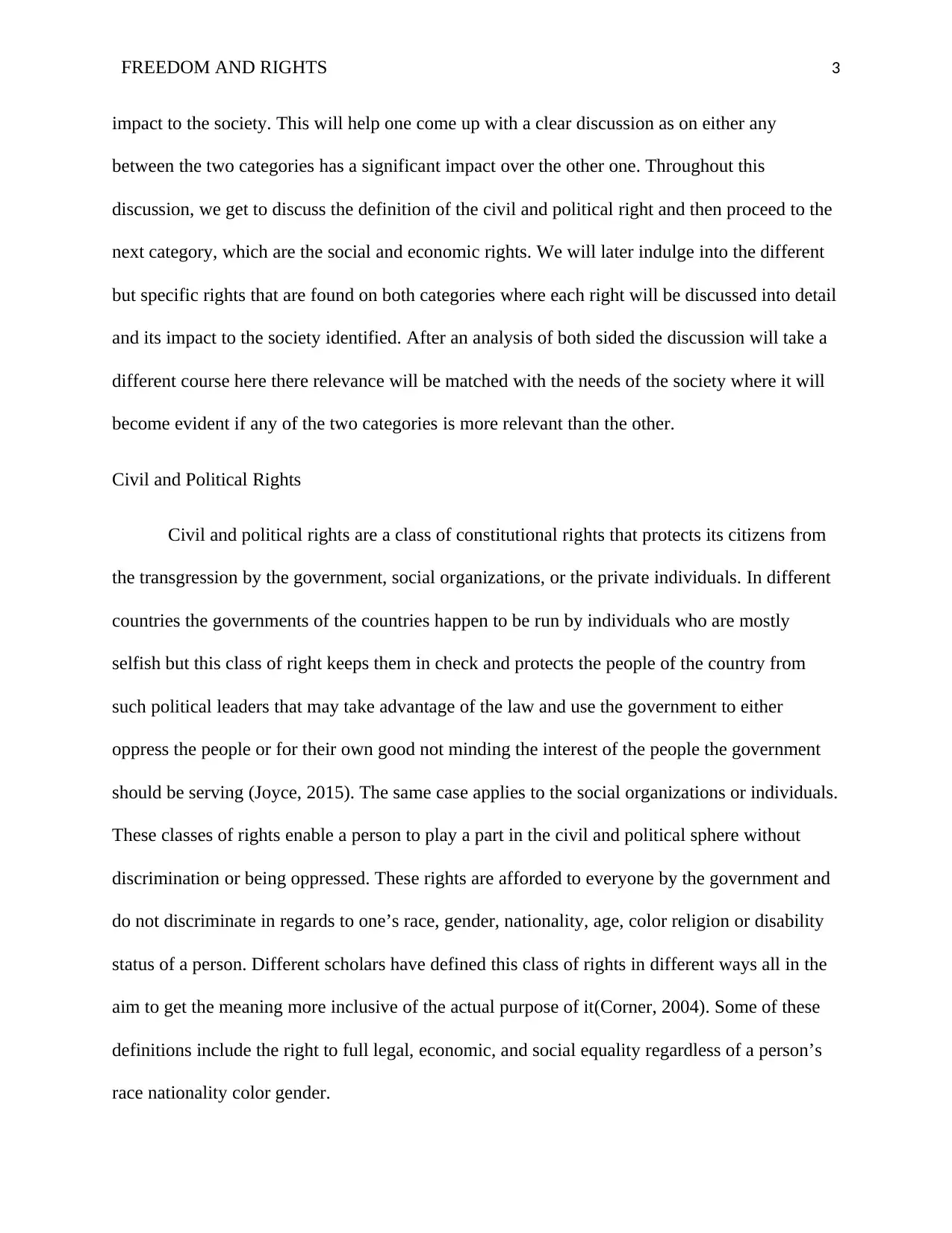
FREEDOM AND RIGHTS 3
impact to the society. This will help one come up with a clear discussion as on either any
between the two categories has a significant impact over the other one. Throughout this
discussion, we get to discuss the definition of the civil and political right and then proceed to the
next category, which are the social and economic rights. We will later indulge into the different
but specific rights that are found on both categories where each right will be discussed into detail
and its impact to the society identified. After an analysis of both sided the discussion will take a
different course here there relevance will be matched with the needs of the society where it will
become evident if any of the two categories is more relevant than the other.
Civil and Political Rights
Civil and political rights are a class of constitutional rights that protects its citizens from
the transgression by the government, social organizations, or the private individuals. In different
countries the governments of the countries happen to be run by individuals who are mostly
selfish but this class of right keeps them in check and protects the people of the country from
such political leaders that may take advantage of the law and use the government to either
oppress the people or for their own good not minding the interest of the people the government
should be serving (Joyce, 2015). The same case applies to the social organizations or individuals.
These classes of rights enable a person to play a part in the civil and political sphere without
discrimination or being oppressed. These rights are afforded to everyone by the government and
do not discriminate in regards to one’s race, gender, nationality, age, color religion or disability
status of a person. Different scholars have defined this class of rights in different ways all in the
aim to get the meaning more inclusive of the actual purpose of it(Corner, 2004). Some of these
definitions include the right to full legal, economic, and social equality regardless of a person’s
race nationality color gender.
impact to the society. This will help one come up with a clear discussion as on either any
between the two categories has a significant impact over the other one. Throughout this
discussion, we get to discuss the definition of the civil and political right and then proceed to the
next category, which are the social and economic rights. We will later indulge into the different
but specific rights that are found on both categories where each right will be discussed into detail
and its impact to the society identified. After an analysis of both sided the discussion will take a
different course here there relevance will be matched with the needs of the society where it will
become evident if any of the two categories is more relevant than the other.
Civil and Political Rights
Civil and political rights are a class of constitutional rights that protects its citizens from
the transgression by the government, social organizations, or the private individuals. In different
countries the governments of the countries happen to be run by individuals who are mostly
selfish but this class of right keeps them in check and protects the people of the country from
such political leaders that may take advantage of the law and use the government to either
oppress the people or for their own good not minding the interest of the people the government
should be serving (Joyce, 2015). The same case applies to the social organizations or individuals.
These classes of rights enable a person to play a part in the civil and political sphere without
discrimination or being oppressed. These rights are afforded to everyone by the government and
do not discriminate in regards to one’s race, gender, nationality, age, color religion or disability
status of a person. Different scholars have defined this class of rights in different ways all in the
aim to get the meaning more inclusive of the actual purpose of it(Corner, 2004). Some of these
definitions include the right to full legal, economic, and social equality regardless of a person’s
race nationality color gender.
⊘ This is a preview!⊘
Do you want full access?
Subscribe today to unlock all pages.

Trusted by 1+ million students worldwide
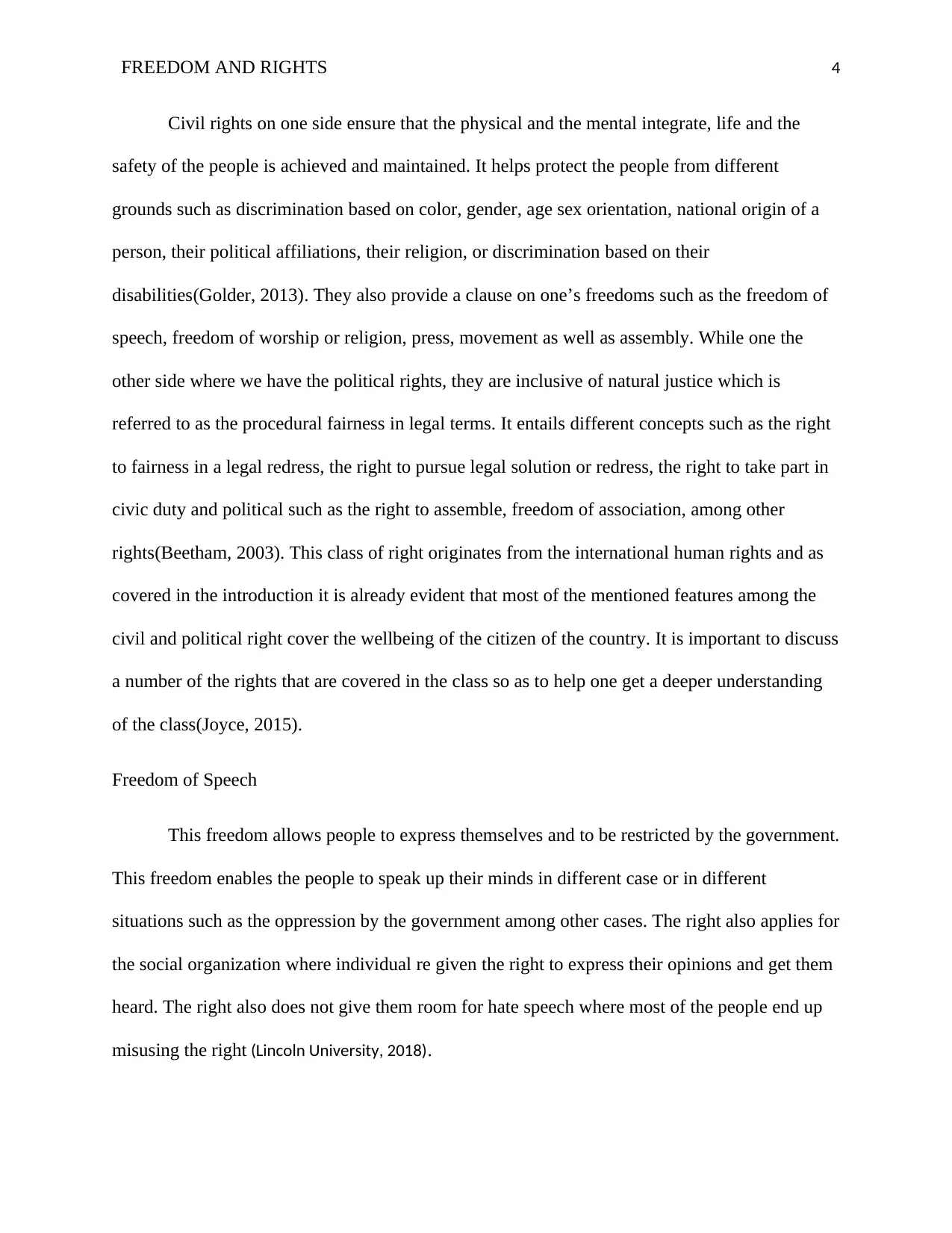
FREEDOM AND RIGHTS 4
Civil rights on one side ensure that the physical and the mental integrate, life and the
safety of the people is achieved and maintained. It helps protect the people from different
grounds such as discrimination based on color, gender, age sex orientation, national origin of a
person, their political affiliations, their religion, or discrimination based on their
disabilities(Golder, 2013). They also provide a clause on one’s freedoms such as the freedom of
speech, freedom of worship or religion, press, movement as well as assembly. While one the
other side where we have the political rights, they are inclusive of natural justice which is
referred to as the procedural fairness in legal terms. It entails different concepts such as the right
to fairness in a legal redress, the right to pursue legal solution or redress, the right to take part in
civic duty and political such as the right to assemble, freedom of association, among other
rights(Beetham, 2003). This class of right originates from the international human rights and as
covered in the introduction it is already evident that most of the mentioned features among the
civil and political right cover the wellbeing of the citizen of the country. It is important to discuss
a number of the rights that are covered in the class so as to help one get a deeper understanding
of the class(Joyce, 2015).
Freedom of Speech
This freedom allows people to express themselves and to be restricted by the government.
This freedom enables the people to speak up their minds in different case or in different
situations such as the oppression by the government among other cases. The right also applies for
the social organization where individual re given the right to express their opinions and get them
heard. The right also does not give them room for hate speech where most of the people end up
misusing the right (Lincoln University, 2018).
Civil rights on one side ensure that the physical and the mental integrate, life and the
safety of the people is achieved and maintained. It helps protect the people from different
grounds such as discrimination based on color, gender, age sex orientation, national origin of a
person, their political affiliations, their religion, or discrimination based on their
disabilities(Golder, 2013). They also provide a clause on one’s freedoms such as the freedom of
speech, freedom of worship or religion, press, movement as well as assembly. While one the
other side where we have the political rights, they are inclusive of natural justice which is
referred to as the procedural fairness in legal terms. It entails different concepts such as the right
to fairness in a legal redress, the right to pursue legal solution or redress, the right to take part in
civic duty and political such as the right to assemble, freedom of association, among other
rights(Beetham, 2003). This class of right originates from the international human rights and as
covered in the introduction it is already evident that most of the mentioned features among the
civil and political right cover the wellbeing of the citizen of the country. It is important to discuss
a number of the rights that are covered in the class so as to help one get a deeper understanding
of the class(Joyce, 2015).
Freedom of Speech
This freedom allows people to express themselves and to be restricted by the government.
This freedom enables the people to speak up their minds in different case or in different
situations such as the oppression by the government among other cases. The right also applies for
the social organization where individual re given the right to express their opinions and get them
heard. The right also does not give them room for hate speech where most of the people end up
misusing the right (Lincoln University, 2018).
Paraphrase This Document
Need a fresh take? Get an instant paraphrase of this document with our AI Paraphraser
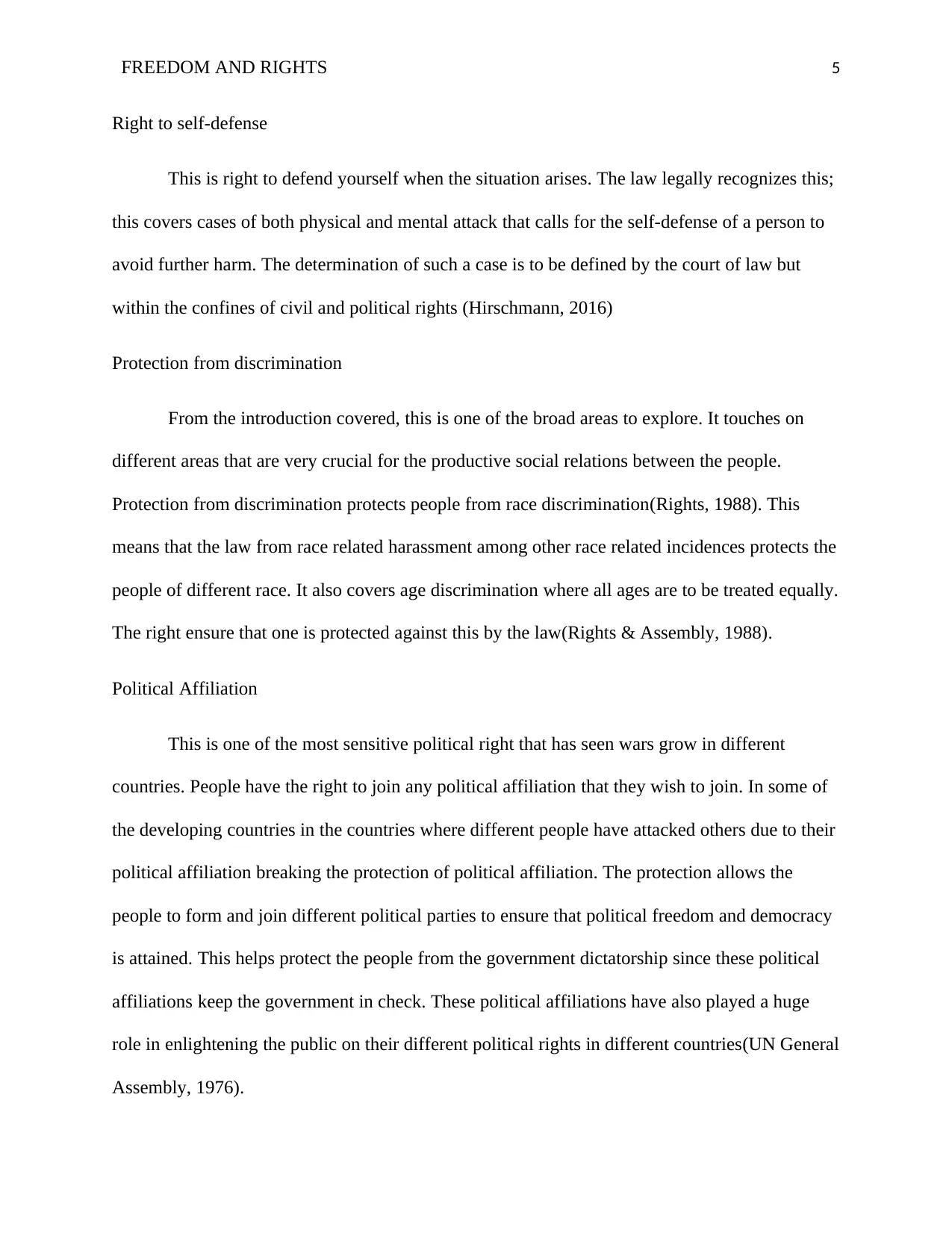
FREEDOM AND RIGHTS 5
Right to self-defense
This is right to defend yourself when the situation arises. The law legally recognizes this;
this covers cases of both physical and mental attack that calls for the self-defense of a person to
avoid further harm. The determination of such a case is to be defined by the court of law but
within the confines of civil and political rights (Hirschmann, 2016)
Protection from discrimination
From the introduction covered, this is one of the broad areas to explore. It touches on
different areas that are very crucial for the productive social relations between the people.
Protection from discrimination protects people from race discrimination(Rights, 1988). This
means that the law from race related harassment among other race related incidences protects the
people of different race. It also covers age discrimination where all ages are to be treated equally.
The right ensure that one is protected against this by the law(Rights & Assembly, 1988).
Political Affiliation
This is one of the most sensitive political right that has seen wars grow in different
countries. People have the right to join any political affiliation that they wish to join. In some of
the developing countries in the countries where different people have attacked others due to their
political affiliation breaking the protection of political affiliation. The protection allows the
people to form and join different political parties to ensure that political freedom and democracy
is attained. This helps protect the people from the government dictatorship since these political
affiliations keep the government in check. These political affiliations have also played a huge
role in enlightening the public on their different political rights in different countries(UN General
Assembly, 1976).
Right to self-defense
This is right to defend yourself when the situation arises. The law legally recognizes this;
this covers cases of both physical and mental attack that calls for the self-defense of a person to
avoid further harm. The determination of such a case is to be defined by the court of law but
within the confines of civil and political rights (Hirschmann, 2016)
Protection from discrimination
From the introduction covered, this is one of the broad areas to explore. It touches on
different areas that are very crucial for the productive social relations between the people.
Protection from discrimination protects people from race discrimination(Rights, 1988). This
means that the law from race related harassment among other race related incidences protects the
people of different race. It also covers age discrimination where all ages are to be treated equally.
The right ensure that one is protected against this by the law(Rights & Assembly, 1988).
Political Affiliation
This is one of the most sensitive political right that has seen wars grow in different
countries. People have the right to join any political affiliation that they wish to join. In some of
the developing countries in the countries where different people have attacked others due to their
political affiliation breaking the protection of political affiliation. The protection allows the
people to form and join different political parties to ensure that political freedom and democracy
is attained. This helps protect the people from the government dictatorship since these political
affiliations keep the government in check. These political affiliations have also played a huge
role in enlightening the public on their different political rights in different countries(UN General
Assembly, 1976).
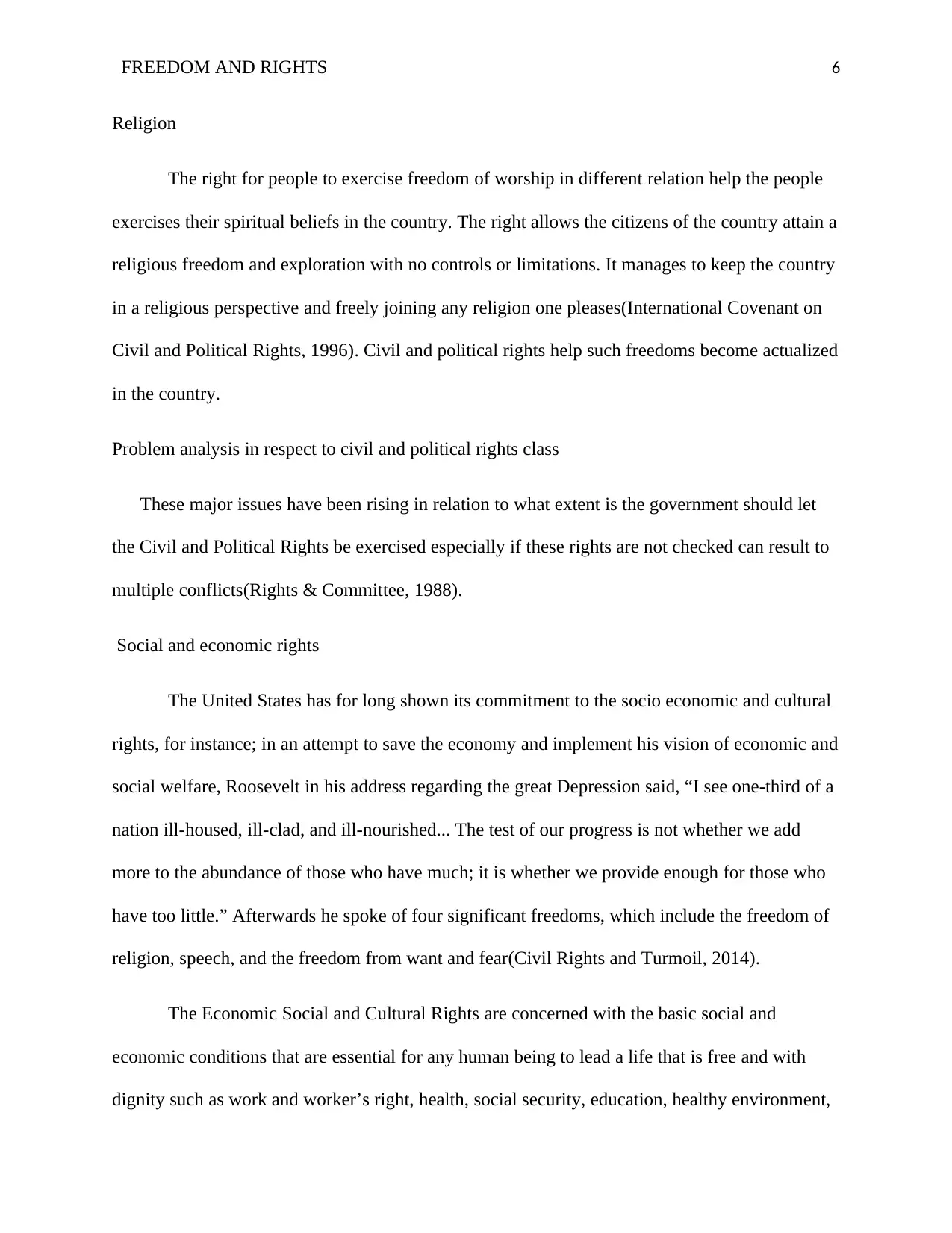
FREEDOM AND RIGHTS 6
Religion
The right for people to exercise freedom of worship in different relation help the people
exercises their spiritual beliefs in the country. The right allows the citizens of the country attain a
religious freedom and exploration with no controls or limitations. It manages to keep the country
in a religious perspective and freely joining any religion one pleases(International Covenant on
Civil and Political Rights, 1996). Civil and political rights help such freedoms become actualized
in the country.
Problem analysis in respect to civil and political rights class
These major issues have been rising in relation to what extent is the government should let
the Civil and Political Rights be exercised especially if these rights are not checked can result to
multiple conflicts(Rights & Committee, 1988).
Social and economic rights
The United States has for long shown its commitment to the socio economic and cultural
rights, for instance; in an attempt to save the economy and implement his vision of economic and
social welfare, Roosevelt in his address regarding the great Depression said, “I see one-third of a
nation ill-housed, ill-clad, and ill-nourished... The test of our progress is not whether we add
more to the abundance of those who have much; it is whether we provide enough for those who
have too little.” Afterwards he spoke of four significant freedoms, which include the freedom of
religion, speech, and the freedom from want and fear(Civil Rights and Turmoil, 2014).
The Economic Social and Cultural Rights are concerned with the basic social and
economic conditions that are essential for any human being to lead a life that is free and with
dignity such as work and worker’s right, health, social security, education, healthy environment,
Religion
The right for people to exercise freedom of worship in different relation help the people
exercises their spiritual beliefs in the country. The right allows the citizens of the country attain a
religious freedom and exploration with no controls or limitations. It manages to keep the country
in a religious perspective and freely joining any religion one pleases(International Covenant on
Civil and Political Rights, 1996). Civil and political rights help such freedoms become actualized
in the country.
Problem analysis in respect to civil and political rights class
These major issues have been rising in relation to what extent is the government should let
the Civil and Political Rights be exercised especially if these rights are not checked can result to
multiple conflicts(Rights & Committee, 1988).
Social and economic rights
The United States has for long shown its commitment to the socio economic and cultural
rights, for instance; in an attempt to save the economy and implement his vision of economic and
social welfare, Roosevelt in his address regarding the great Depression said, “I see one-third of a
nation ill-housed, ill-clad, and ill-nourished... The test of our progress is not whether we add
more to the abundance of those who have much; it is whether we provide enough for those who
have too little.” Afterwards he spoke of four significant freedoms, which include the freedom of
religion, speech, and the freedom from want and fear(Civil Rights and Turmoil, 2014).
The Economic Social and Cultural Rights are concerned with the basic social and
economic conditions that are essential for any human being to lead a life that is free and with
dignity such as work and worker’s right, health, social security, education, healthy environment,
⊘ This is a preview!⊘
Do you want full access?
Subscribe today to unlock all pages.

Trusted by 1+ million students worldwide
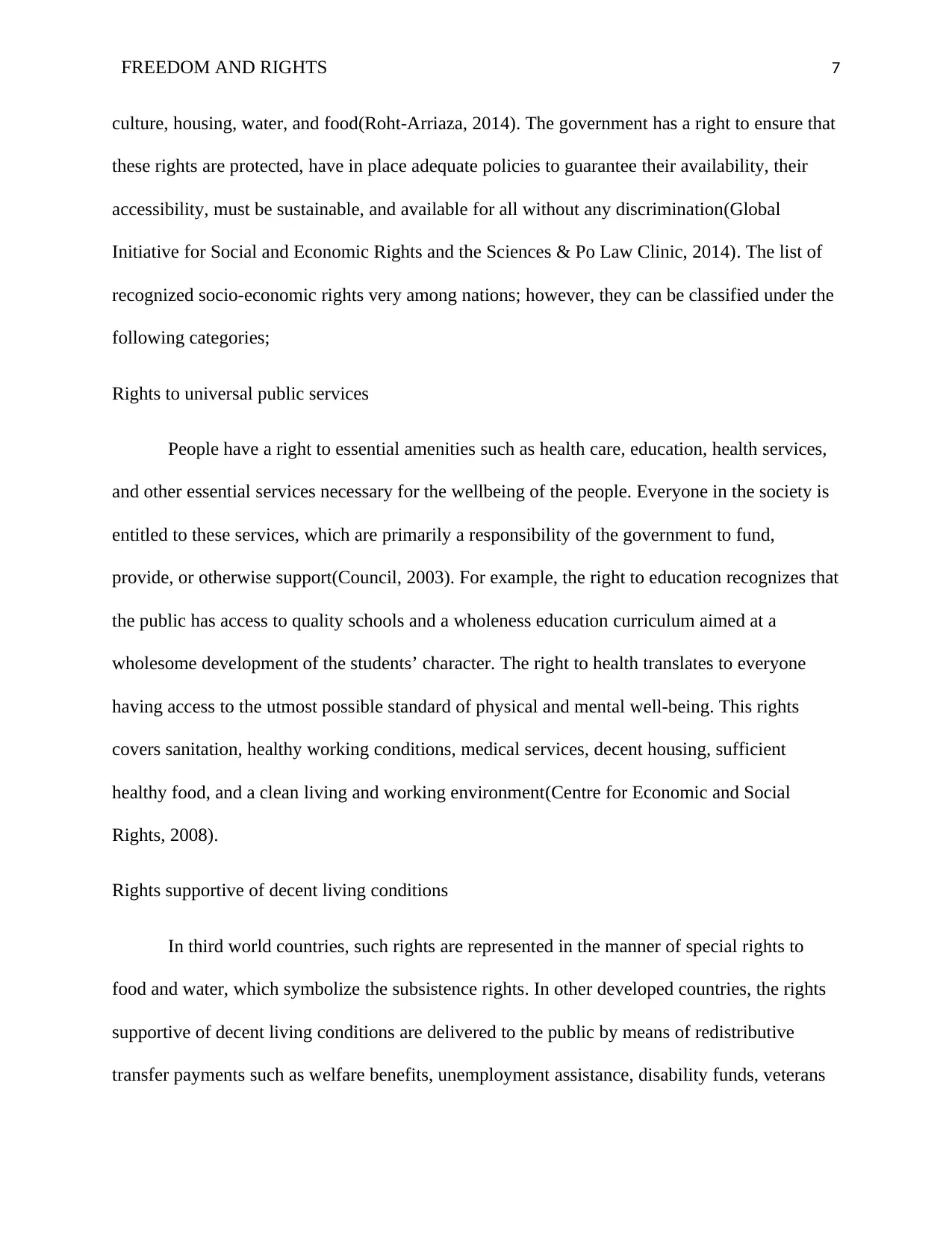
FREEDOM AND RIGHTS 7
culture, housing, water, and food(Roht-Arriaza, 2014). The government has a right to ensure that
these rights are protected, have in place adequate policies to guarantee their availability, their
accessibility, must be sustainable, and available for all without any discrimination(Global
Initiative for Social and Economic Rights and the Sciences & Po Law Clinic, 2014). The list of
recognized socio-economic rights very among nations; however, they can be classified under the
following categories;
Rights to universal public services
People have a right to essential amenities such as health care, education, health services,
and other essential services necessary for the wellbeing of the people. Everyone in the society is
entitled to these services, which are primarily a responsibility of the government to fund,
provide, or otherwise support(Council, 2003). For example, the right to education recognizes that
the public has access to quality schools and a wholeness education curriculum aimed at a
wholesome development of the students’ character. The right to health translates to everyone
having access to the utmost possible standard of physical and mental well-being. This rights
covers sanitation, healthy working conditions, medical services, decent housing, sufficient
healthy food, and a clean living and working environment(Centre for Economic and Social
Rights, 2008).
Rights supportive of decent living conditions
In third world countries, such rights are represented in the manner of special rights to
food and water, which symbolize the subsistence rights. In other developed countries, the rights
supportive of decent living conditions are delivered to the public by means of redistributive
transfer payments such as welfare benefits, unemployment assistance, disability funds, veterans
culture, housing, water, and food(Roht-Arriaza, 2014). The government has a right to ensure that
these rights are protected, have in place adequate policies to guarantee their availability, their
accessibility, must be sustainable, and available for all without any discrimination(Global
Initiative for Social and Economic Rights and the Sciences & Po Law Clinic, 2014). The list of
recognized socio-economic rights very among nations; however, they can be classified under the
following categories;
Rights to universal public services
People have a right to essential amenities such as health care, education, health services,
and other essential services necessary for the wellbeing of the people. Everyone in the society is
entitled to these services, which are primarily a responsibility of the government to fund,
provide, or otherwise support(Council, 2003). For example, the right to education recognizes that
the public has access to quality schools and a wholeness education curriculum aimed at a
wholesome development of the students’ character. The right to health translates to everyone
having access to the utmost possible standard of physical and mental well-being. This rights
covers sanitation, healthy working conditions, medical services, decent housing, sufficient
healthy food, and a clean living and working environment(Centre for Economic and Social
Rights, 2008).
Rights supportive of decent living conditions
In third world countries, such rights are represented in the manner of special rights to
food and water, which symbolize the subsistence rights. In other developed countries, the rights
supportive of decent living conditions are delivered to the public by means of redistributive
transfer payments such as welfare benefits, unemployment assistance, disability funds, veterans
Paraphrase This Document
Need a fresh take? Get an instant paraphrase of this document with our AI Paraphraser
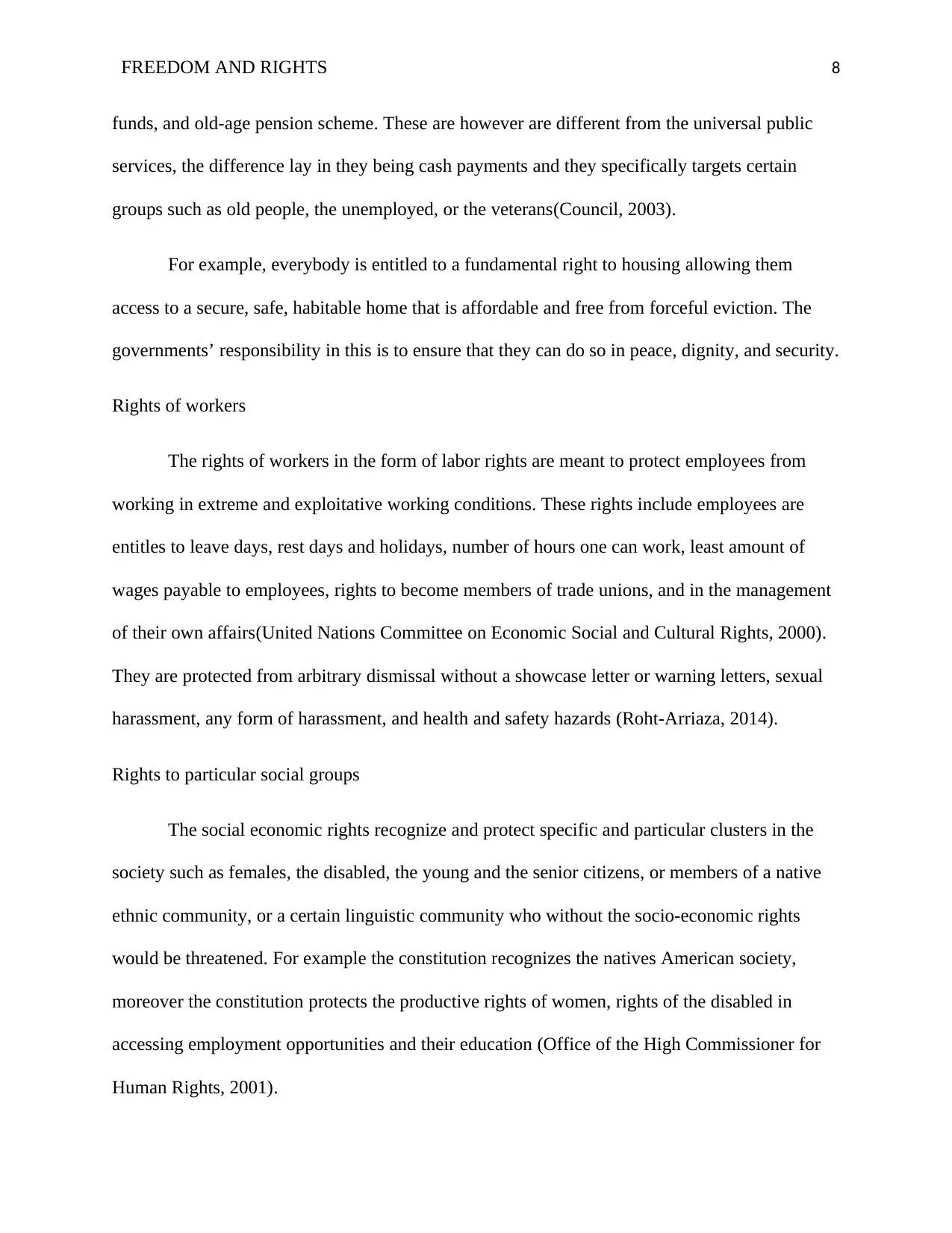
FREEDOM AND RIGHTS 8
funds, and old-age pension scheme. These are however are different from the universal public
services, the difference lay in they being cash payments and they specifically targets certain
groups such as old people, the unemployed, or the veterans(Council, 2003).
For example, everybody is entitled to a fundamental right to housing allowing them
access to a secure, safe, habitable home that is affordable and free from forceful eviction. The
governments’ responsibility in this is to ensure that they can do so in peace, dignity, and security.
Rights of workers
The rights of workers in the form of labor rights are meant to protect employees from
working in extreme and exploitative working conditions. These rights include employees are
entitles to leave days, rest days and holidays, number of hours one can work, least amount of
wages payable to employees, rights to become members of trade unions, and in the management
of their own affairs(United Nations Committee on Economic Social and Cultural Rights, 2000).
They are protected from arbitrary dismissal without a showcase letter or warning letters, sexual
harassment, any form of harassment, and health and safety hazards (Roht-Arriaza, 2014).
Rights to particular social groups
The social economic rights recognize and protect specific and particular clusters in the
society such as females, the disabled, the young and the senior citizens, or members of a native
ethnic community, or a certain linguistic community who without the socio-economic rights
would be threatened. For example the constitution recognizes the natives American society,
moreover the constitution protects the productive rights of women, rights of the disabled in
accessing employment opportunities and their education (Office of the High Commissioner for
Human Rights, 2001).
funds, and old-age pension scheme. These are however are different from the universal public
services, the difference lay in they being cash payments and they specifically targets certain
groups such as old people, the unemployed, or the veterans(Council, 2003).
For example, everybody is entitled to a fundamental right to housing allowing them
access to a secure, safe, habitable home that is affordable and free from forceful eviction. The
governments’ responsibility in this is to ensure that they can do so in peace, dignity, and security.
Rights of workers
The rights of workers in the form of labor rights are meant to protect employees from
working in extreme and exploitative working conditions. These rights include employees are
entitles to leave days, rest days and holidays, number of hours one can work, least amount of
wages payable to employees, rights to become members of trade unions, and in the management
of their own affairs(United Nations Committee on Economic Social and Cultural Rights, 2000).
They are protected from arbitrary dismissal without a showcase letter or warning letters, sexual
harassment, any form of harassment, and health and safety hazards (Roht-Arriaza, 2014).
Rights to particular social groups
The social economic rights recognize and protect specific and particular clusters in the
society such as females, the disabled, the young and the senior citizens, or members of a native
ethnic community, or a certain linguistic community who without the socio-economic rights
would be threatened. For example the constitution recognizes the natives American society,
moreover the constitution protects the productive rights of women, rights of the disabled in
accessing employment opportunities and their education (Office of the High Commissioner for
Human Rights, 2001).
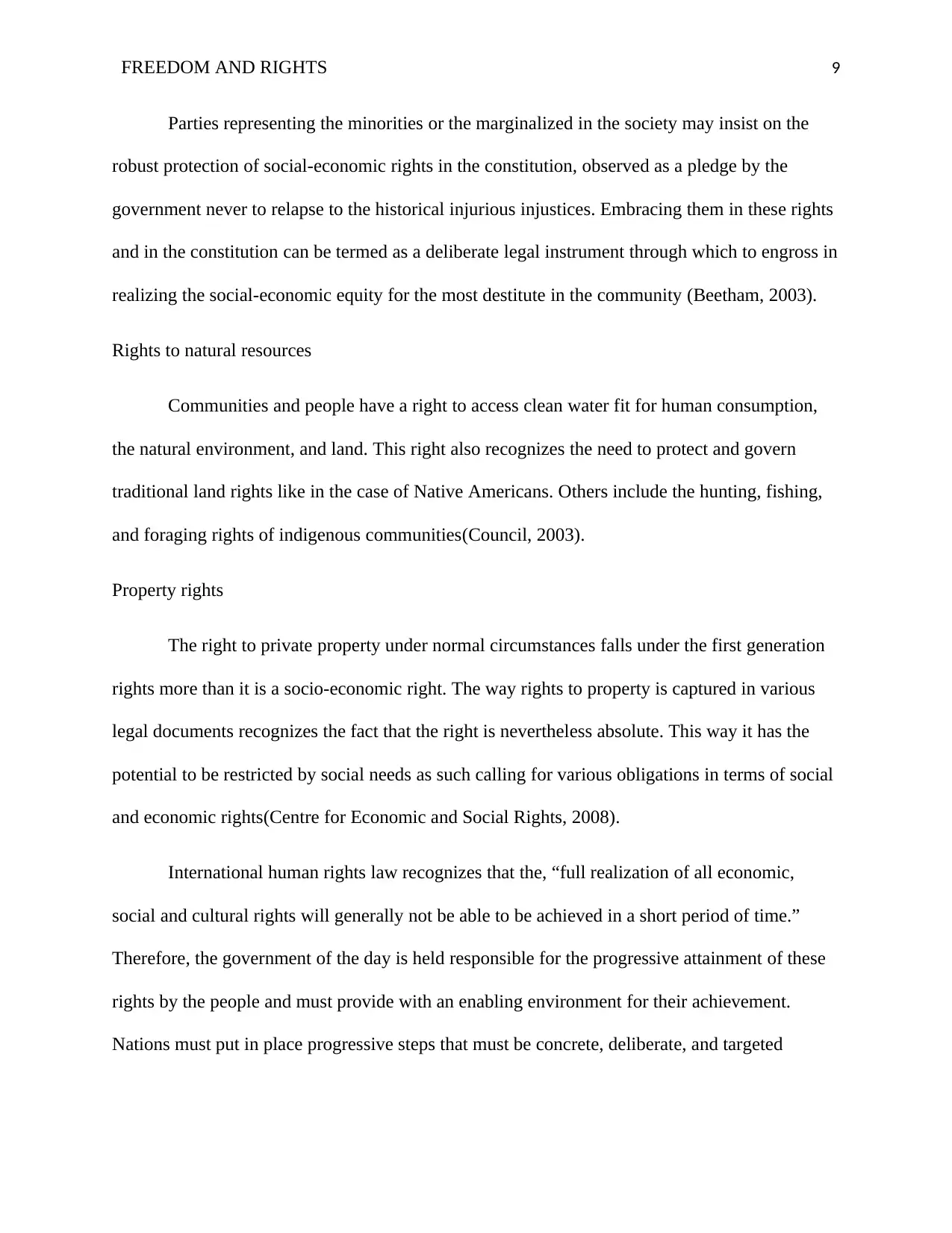
FREEDOM AND RIGHTS 9
Parties representing the minorities or the marginalized in the society may insist on the
robust protection of social-economic rights in the constitution, observed as a pledge by the
government never to relapse to the historical injurious injustices. Embracing them in these rights
and in the constitution can be termed as a deliberate legal instrument through which to engross in
realizing the social-economic equity for the most destitute in the community (Beetham, 2003).
Rights to natural resources
Communities and people have a right to access clean water fit for human consumption,
the natural environment, and land. This right also recognizes the need to protect and govern
traditional land rights like in the case of Native Americans. Others include the hunting, fishing,
and foraging rights of indigenous communities(Council, 2003).
Property rights
The right to private property under normal circumstances falls under the first generation
rights more than it is a socio-economic right. The way rights to property is captured in various
legal documents recognizes the fact that the right is nevertheless absolute. This way it has the
potential to be restricted by social needs as such calling for various obligations in terms of social
and economic rights(Centre for Economic and Social Rights, 2008).
International human rights law recognizes that the, “full realization of all economic,
social and cultural rights will generally not be able to be achieved in a short period of time.”
Therefore, the government of the day is held responsible for the progressive attainment of these
rights by the people and must provide with an enabling environment for their achievement.
Nations must put in place progressive steps that must be concrete, deliberate, and targeted
Parties representing the minorities or the marginalized in the society may insist on the
robust protection of social-economic rights in the constitution, observed as a pledge by the
government never to relapse to the historical injurious injustices. Embracing them in these rights
and in the constitution can be termed as a deliberate legal instrument through which to engross in
realizing the social-economic equity for the most destitute in the community (Beetham, 2003).
Rights to natural resources
Communities and people have a right to access clean water fit for human consumption,
the natural environment, and land. This right also recognizes the need to protect and govern
traditional land rights like in the case of Native Americans. Others include the hunting, fishing,
and foraging rights of indigenous communities(Council, 2003).
Property rights
The right to private property under normal circumstances falls under the first generation
rights more than it is a socio-economic right. The way rights to property is captured in various
legal documents recognizes the fact that the right is nevertheless absolute. This way it has the
potential to be restricted by social needs as such calling for various obligations in terms of social
and economic rights(Centre for Economic and Social Rights, 2008).
International human rights law recognizes that the, “full realization of all economic,
social and cultural rights will generally not be able to be achieved in a short period of time.”
Therefore, the government of the day is held responsible for the progressive attainment of these
rights by the people and must provide with an enabling environment for their achievement.
Nations must put in place progressive steps that must be concrete, deliberate, and targeted
⊘ This is a preview!⊘
Do you want full access?
Subscribe today to unlock all pages.

Trusted by 1+ million students worldwide
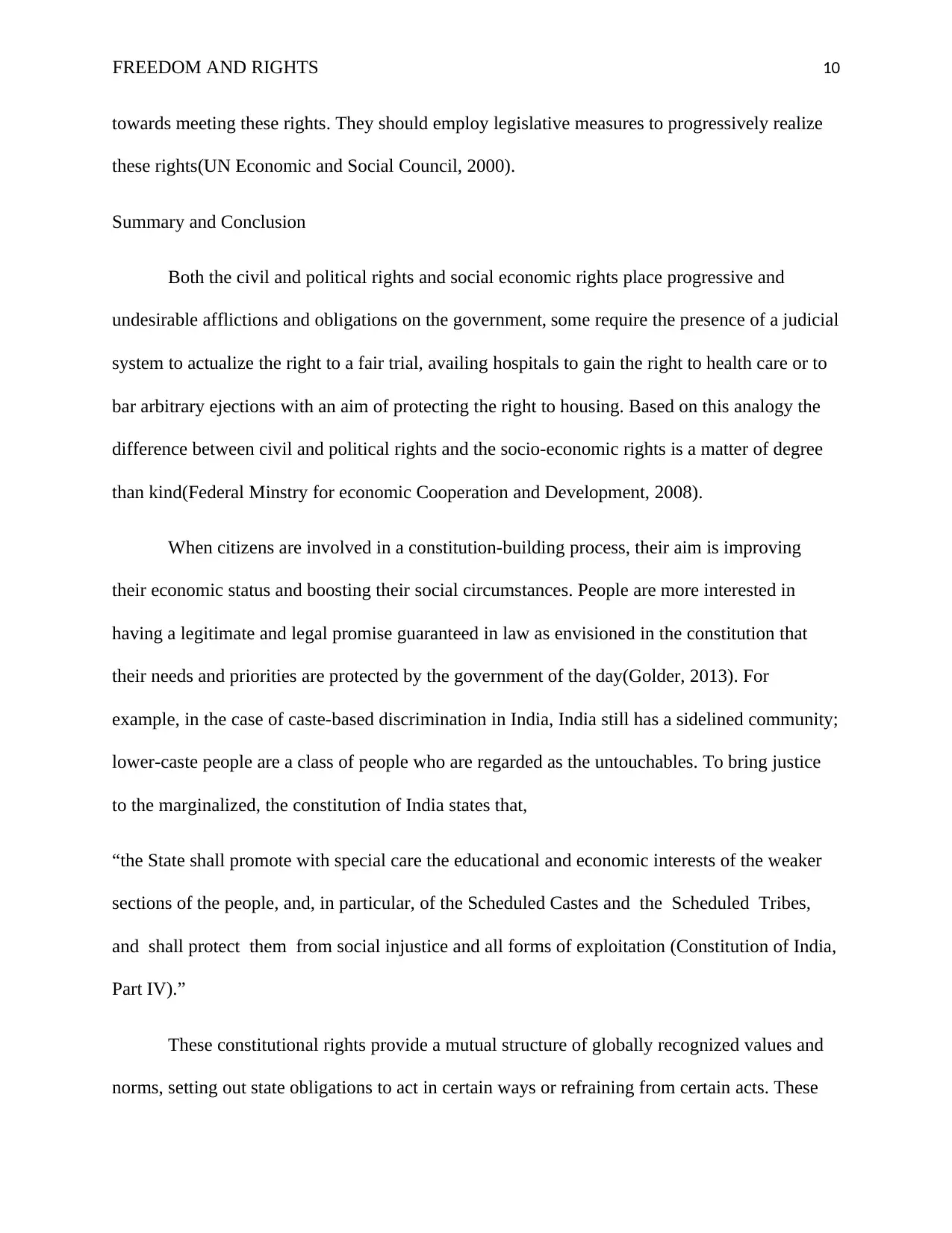
FREEDOM AND RIGHTS 10
towards meeting these rights. They should employ legislative measures to progressively realize
these rights(UN Economic and Social Council, 2000).
Summary and Conclusion
Both the civil and political rights and social economic rights place progressive and
undesirable afflictions and obligations on the government, some require the presence of a judicial
system to actualize the right to a fair trial, availing hospitals to gain the right to health care or to
bar arbitrary ejections with an aim of protecting the right to housing. Based on this analogy the
difference between civil and political rights and the socio-economic rights is a matter of degree
than kind(Federal Minstry for economic Cooperation and Development, 2008).
When citizens are involved in a constitution-building process, their aim is improving
their economic status and boosting their social circumstances. People are more interested in
having a legitimate and legal promise guaranteed in law as envisioned in the constitution that
their needs and priorities are protected by the government of the day(Golder, 2013). For
example, in the case of caste-based discrimination in India, India still has a sidelined community;
lower-caste people are a class of people who are regarded as the untouchables. To bring justice
to the marginalized, the constitution of India states that,
“the State shall promote with special care the educational and economic interests of the weaker
sections of the people, and, in particular, of the Scheduled Castes and the Scheduled Tribes,
and shall protect them from social injustice and all forms of exploitation (Constitution of India,
Part IV).”
These constitutional rights provide a mutual structure of globally recognized values and
norms, setting out state obligations to act in certain ways or refraining from certain acts. These
towards meeting these rights. They should employ legislative measures to progressively realize
these rights(UN Economic and Social Council, 2000).
Summary and Conclusion
Both the civil and political rights and social economic rights place progressive and
undesirable afflictions and obligations on the government, some require the presence of a judicial
system to actualize the right to a fair trial, availing hospitals to gain the right to health care or to
bar arbitrary ejections with an aim of protecting the right to housing. Based on this analogy the
difference between civil and political rights and the socio-economic rights is a matter of degree
than kind(Federal Minstry for economic Cooperation and Development, 2008).
When citizens are involved in a constitution-building process, their aim is improving
their economic status and boosting their social circumstances. People are more interested in
having a legitimate and legal promise guaranteed in law as envisioned in the constitution that
their needs and priorities are protected by the government of the day(Golder, 2013). For
example, in the case of caste-based discrimination in India, India still has a sidelined community;
lower-caste people are a class of people who are regarded as the untouchables. To bring justice
to the marginalized, the constitution of India states that,
“the State shall promote with special care the educational and economic interests of the weaker
sections of the people, and, in particular, of the Scheduled Castes and the Scheduled Tribes,
and shall protect them from social injustice and all forms of exploitation (Constitution of India,
Part IV).”
These constitutional rights provide a mutual structure of globally recognized values and
norms, setting out state obligations to act in certain ways or refraining from certain acts. These
Paraphrase This Document
Need a fresh take? Get an instant paraphrase of this document with our AI Paraphraser
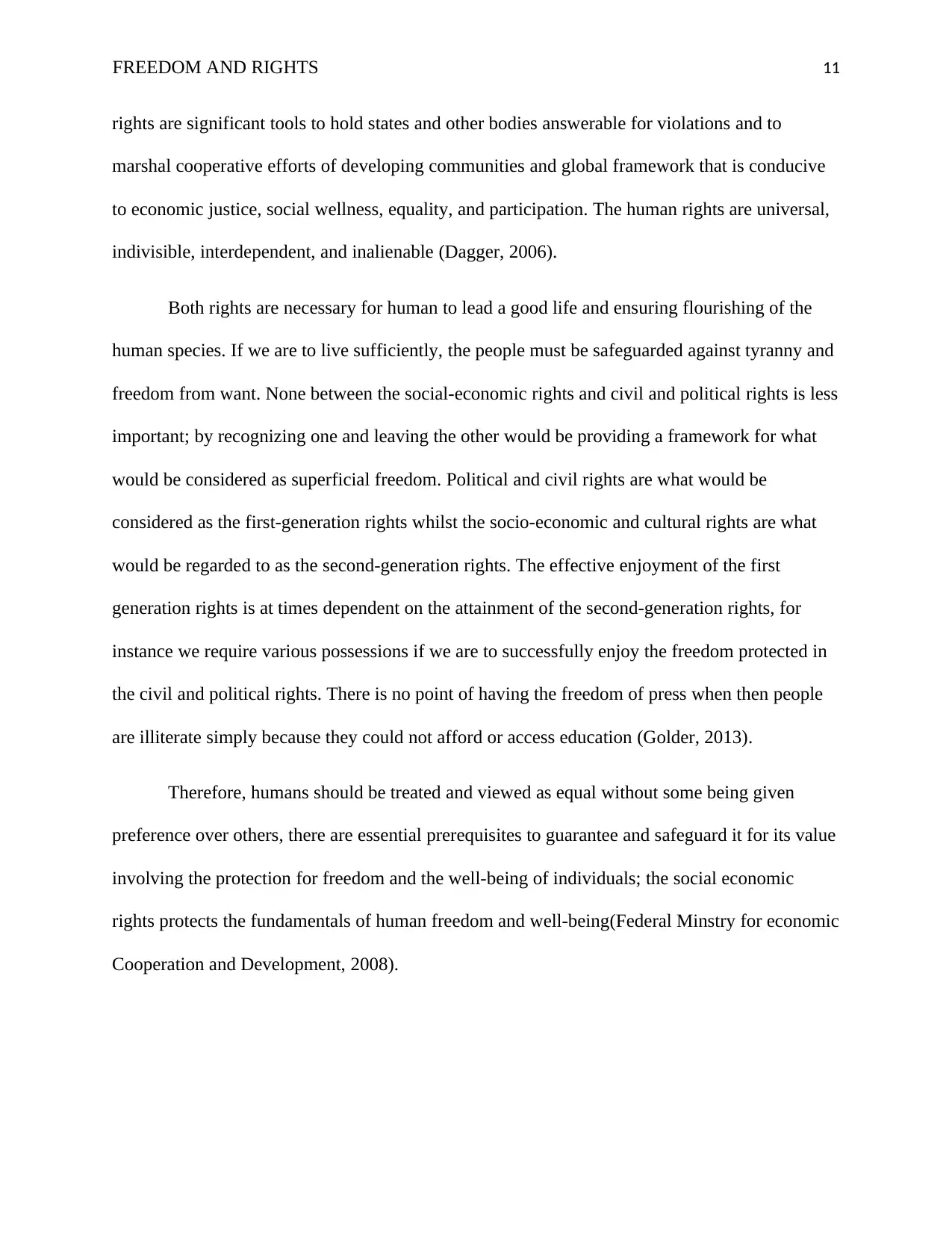
FREEDOM AND RIGHTS 11
rights are significant tools to hold states and other bodies answerable for violations and to
marshal cooperative efforts of developing communities and global framework that is conducive
to economic justice, social wellness, equality, and participation. The human rights are universal,
indivisible, interdependent, and inalienable (Dagger, 2006).
Both rights are necessary for human to lead a good life and ensuring flourishing of the
human species. If we are to live sufficiently, the people must be safeguarded against tyranny and
freedom from want. None between the social-economic rights and civil and political rights is less
important; by recognizing one and leaving the other would be providing a framework for what
would be considered as superficial freedom. Political and civil rights are what would be
considered as the first-generation rights whilst the socio-economic and cultural rights are what
would be regarded to as the second-generation rights. The effective enjoyment of the first
generation rights is at times dependent on the attainment of the second-generation rights, for
instance we require various possessions if we are to successfully enjoy the freedom protected in
the civil and political rights. There is no point of having the freedom of press when then people
are illiterate simply because they could not afford or access education (Golder, 2013).
Therefore, humans should be treated and viewed as equal without some being given
preference over others, there are essential prerequisites to guarantee and safeguard it for its value
involving the protection for freedom and the well-being of individuals; the social economic
rights protects the fundamentals of human freedom and well-being(Federal Minstry for economic
Cooperation and Development, 2008).
rights are significant tools to hold states and other bodies answerable for violations and to
marshal cooperative efforts of developing communities and global framework that is conducive
to economic justice, social wellness, equality, and participation. The human rights are universal,
indivisible, interdependent, and inalienable (Dagger, 2006).
Both rights are necessary for human to lead a good life and ensuring flourishing of the
human species. If we are to live sufficiently, the people must be safeguarded against tyranny and
freedom from want. None between the social-economic rights and civil and political rights is less
important; by recognizing one and leaving the other would be providing a framework for what
would be considered as superficial freedom. Political and civil rights are what would be
considered as the first-generation rights whilst the socio-economic and cultural rights are what
would be regarded to as the second-generation rights. The effective enjoyment of the first
generation rights is at times dependent on the attainment of the second-generation rights, for
instance we require various possessions if we are to successfully enjoy the freedom protected in
the civil and political rights. There is no point of having the freedom of press when then people
are illiterate simply because they could not afford or access education (Golder, 2013).
Therefore, humans should be treated and viewed as equal without some being given
preference over others, there are essential prerequisites to guarantee and safeguard it for its value
involving the protection for freedom and the well-being of individuals; the social economic
rights protects the fundamentals of human freedom and well-being(Federal Minstry for economic
Cooperation and Development, 2008).
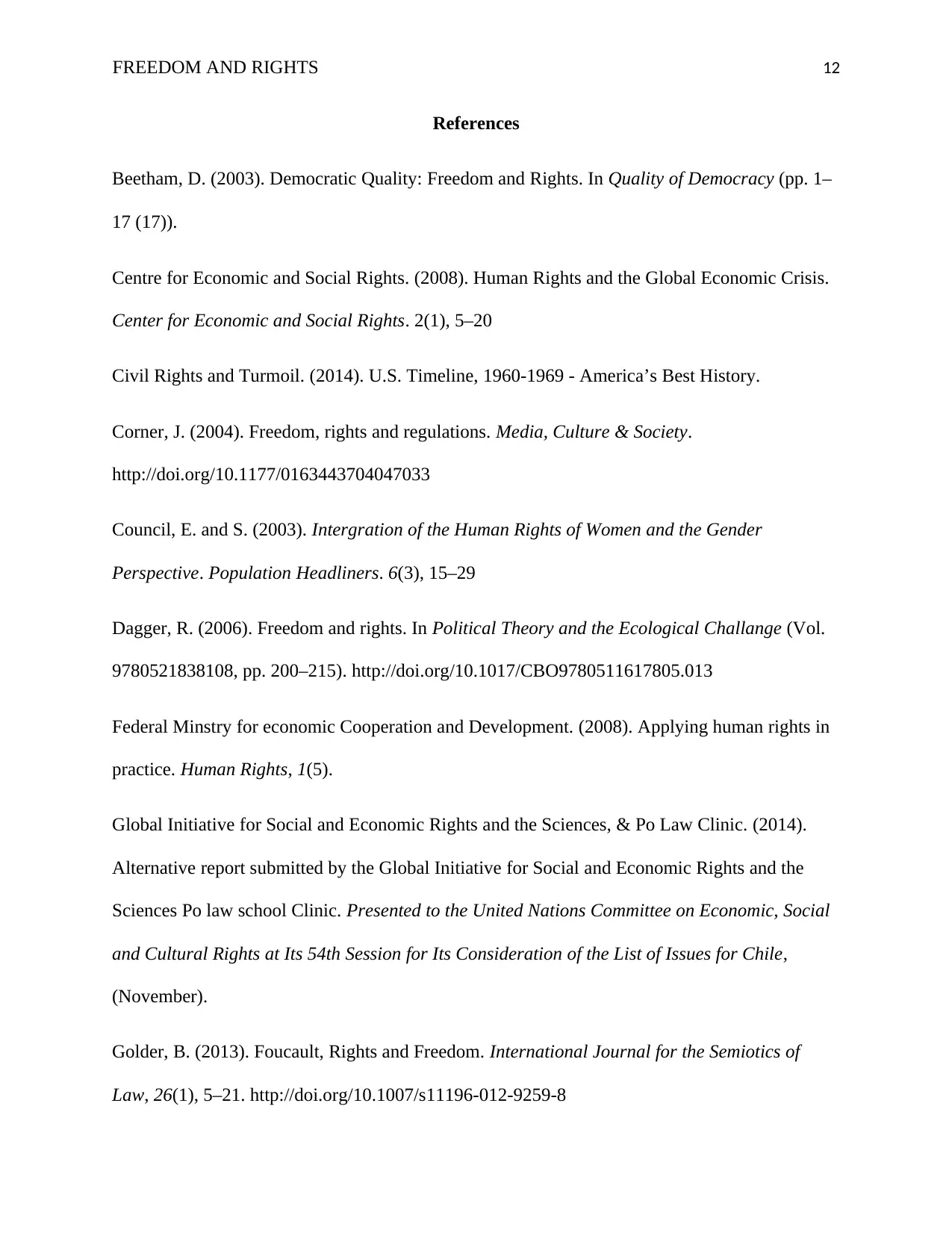
FREEDOM AND RIGHTS 12
References
Beetham, D. (2003). Democratic Quality: Freedom and Rights. In Quality of Democracy (pp. 1–
17 (17)).
Centre for Economic and Social Rights. (2008). Human Rights and the Global Economic Crisis.
Center for Economic and Social Rights. 2(1), 5–20
Civil Rights and Turmoil. (2014). U.S. Timeline, 1960-1969 - America’s Best History.
Corner, J. (2004). Freedom, rights and regulations. Media, Culture & Society.
http://doi.org/10.1177/0163443704047033
Council, E. and S. (2003). Intergration of the Human Rights of Women and the Gender
Perspective. Population Headliners. 6(3), 15–29
Dagger, R. (2006). Freedom and rights. In Political Theory and the Ecological Challange (Vol.
9780521838108, pp. 200–215). http://doi.org/10.1017/CBO9780511617805.013
Federal Minstry for economic Cooperation and Development. (2008). Applying human rights in
practice. Human Rights, 1(5).
Global Initiative for Social and Economic Rights and the Sciences, & Po Law Clinic. (2014).
Alternative report submitted by the Global Initiative for Social and Economic Rights and the
Sciences Po law school Clinic. Presented to the United Nations Committee on Economic, Social
and Cultural Rights at Its 54th Session for Its Consideration of the List of Issues for Chile,
(November).
Golder, B. (2013). Foucault, Rights and Freedom. International Journal for the Semiotics of
Law, 26(1), 5–21. http://doi.org/10.1007/s11196-012-9259-8
References
Beetham, D. (2003). Democratic Quality: Freedom and Rights. In Quality of Democracy (pp. 1–
17 (17)).
Centre for Economic and Social Rights. (2008). Human Rights and the Global Economic Crisis.
Center for Economic and Social Rights. 2(1), 5–20
Civil Rights and Turmoil. (2014). U.S. Timeline, 1960-1969 - America’s Best History.
Corner, J. (2004). Freedom, rights and regulations. Media, Culture & Society.
http://doi.org/10.1177/0163443704047033
Council, E. and S. (2003). Intergration of the Human Rights of Women and the Gender
Perspective. Population Headliners. 6(3), 15–29
Dagger, R. (2006). Freedom and rights. In Political Theory and the Ecological Challange (Vol.
9780521838108, pp. 200–215). http://doi.org/10.1017/CBO9780511617805.013
Federal Minstry for economic Cooperation and Development. (2008). Applying human rights in
practice. Human Rights, 1(5).
Global Initiative for Social and Economic Rights and the Sciences, & Po Law Clinic. (2014).
Alternative report submitted by the Global Initiative for Social and Economic Rights and the
Sciences Po law school Clinic. Presented to the United Nations Committee on Economic, Social
and Cultural Rights at Its 54th Session for Its Consideration of the List of Issues for Chile,
(November).
Golder, B. (2013). Foucault, Rights and Freedom. International Journal for the Semiotics of
Law, 26(1), 5–21. http://doi.org/10.1007/s11196-012-9259-8
⊘ This is a preview!⊘
Do you want full access?
Subscribe today to unlock all pages.

Trusted by 1+ million students worldwide
1 out of 14
Related Documents
Your All-in-One AI-Powered Toolkit for Academic Success.
+13062052269
info@desklib.com
Available 24*7 on WhatsApp / Email
![[object Object]](/_next/static/media/star-bottom.7253800d.svg)
Unlock your academic potential
Copyright © 2020–2026 A2Z Services. All Rights Reserved. Developed and managed by ZUCOL.





